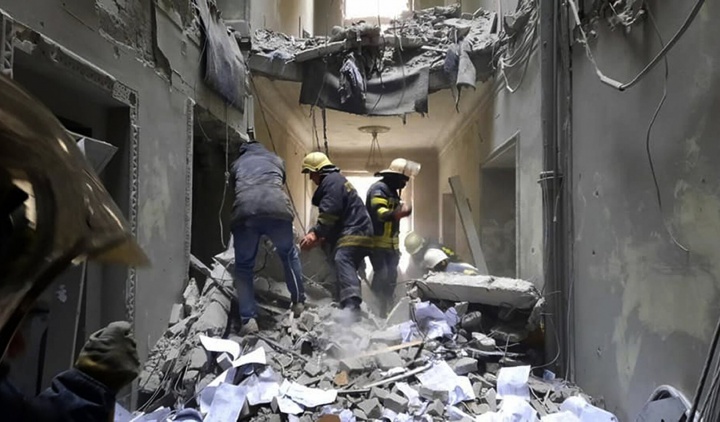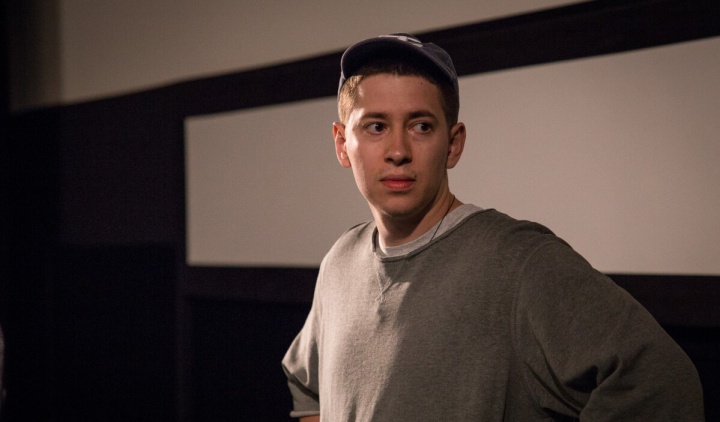Where are you right now?
I'm in a village near Uzhhorod in the Transcarpathian region.
Where were you on the first day of the war?
I woke up to the sounds of explosions in Kyiv. My wife said that the war has come. You can expect a scene like this in a war movie, but in our modern world, I thought this would be impossible until that day. The air raid siren wasn’t heard in Kyiv since World War II. We decided to take some food and toys for our three-year-old son and went to our car. We left Kyiv, we weren’t even sure where we could go. And should we say goodbye to our home or not?
Did you leave the city in a rush?
Until that day we stayed in Kyiv because we didn't think the war here in the capital could become a reality. I was finishing my second film, and living a normal life, raising my son. It was a quick decision, we wanted to go somewhere where our son would be safe. It was very hard to find fuel, there were really huge queues on the roads and traveling with a little child causes additional obstacles.
Did your three-years-old child know there is a war going on around him?
In some way I did what Roberto Benigni did in Life is Beautiful. When the explosions started in Kyiv, I didn’t tell him the truth. I said that this is the sound of a fire alarm, because he likes to play with firefighters. We left and spent two days on the road heading west, just like in an apocalyptic movie.
My son was enjoying french fries and hot dogs at gas stations, because we ran out of normal food on the second day. Although petrol was hard to find, fortunately the gas stations were full of hot dogs.
.jpg)
Antonio Lukich at the 54th Karlovy Vary International Film Festival / photo: kviff.com
What is the Ukrainian film community doing right now? For example, are there any directors and film crews who are trying to document the war?
Vladimir Yatsenko, the producer we work with, went back to Kyiv – there was even an article about him in Screen Daily. My community is trying to find ways to make videos, documentaries about our situation and inform the world. Those who are not in Kyiv are editing footage, translating them into German, English and other languages and making subtitles.
Do you participate in this work?
Of course, I’ve already offered my help to teams producing documentary films.
The Ukrainian Film Academy called for an international boycott of Russian cinema following the invasion. Do you agree with that?
I agree with all kinds of boycotts, because this is an unprecedented and brutal aggression. We need to defend ourselves in every possible way. This is a very painful time for us, people need to hide in basements and bomb shelters. It's very hard to stand against the Russian aggression, but we have an increased sense of patriotism, we are fighting, volunteering, everybody is doing what they are able to do to help defend our country.
I’ve seen photos of civilians making Molotov-cocktails. Do you also volunteer in such activities?
My wife and I have no experience in making molotov-cocktails, but we have experience in humanitarian assistance. We bought medicine and food for refugees, and we are helping them to find a place to live.
The internet is full of short videos showing Ukrainian civilians and soldiers doing heroic acts. You mentioned the increased sense of patriotism. Do you think these videos contribute greatly to the determination of Ukrainian people?
Yes, such videos are important. Today everyone has cameras, so everyone can contribute to the chronicle of war. One of the key activities of the film community is to edit these videos, and speak to the world through them.
These videos have a great impact on the world.
We try to tell the world to wake up. If Ukraine won’t be able to stop the Russian aggression, the same could happen with another country. No country should feel safe in the eastern part of Europe because of the imperialistic goals of the Russian leadership. Ukraine chose freedom, and if freedom is important for us, we need to unite.

City Hall in Kharkiv / photo: Ukrainian Emergency Service
Do you have any optimism about the near future?
I try to have optimistic thoughts, but it’s very hard when huge tragedies are happening. For example, the main actors of my film are staying in Kharkiv – and Kharkiv is severely bombed everyday.
Someone told me that in time we will make movies about the war. My first movie was a dramedy, the second one I was working on is a tragicomedy. But seeing all these tragedies, I’m not sure I will be able to do a comedy again. Frankly It’s so unpredictable now, it’s impossible to guess what I will do later.
Right now, I want to make sure that my wife and my child are safe. After that, I will try to do something useful in this situation. I don’t know how far the war and the destruction will go. Maybe volunteering is not enough...
I know it's not the right time to talk about your movie. But let me ask. What is the situation with it?
My second movie is my masterpiece. We’ve been working on it for more than 2 and a half years. It’s lyrical, it has great drama, and even funny parts. I am proud of my movie. We filmed it in Kyiv, Lubny and Luxembourg and we did our best. But the materials stayed in Kyiv and we were unable to take them to a safe place. So now we just hope they will not be destroyed. But does it really matter now? Not really.
Could you tell us how the war affects Uzhhorod?
Streets are calm, but everyone is suspicious. There are many refugees here from other parts of the country, it’s a place where refugees can feel a bit safer. The stores have enough food, but there is a limit on purchases. For example, you can buy a maximum of three packets of flour. There hasn’t been any bombings here yet and I hope there won’t be at all, nonetheless we are trying to find a place where we can hide if it starts.
How can the people of Hungary help Ukranians?
They should go to anti-war demonstrations and ask their government to support Ukraine.





